 Young
Peter at around 7.
Young
Peter at around 7.Beloved Husband, Parent, Brother and very much loved Papau
 Young
Peter at around 7.
Young
Peter at around 7.This photograph is believed to have been taken around 1925 on the roof of the tenement on the Lower East Side where Peter was born.
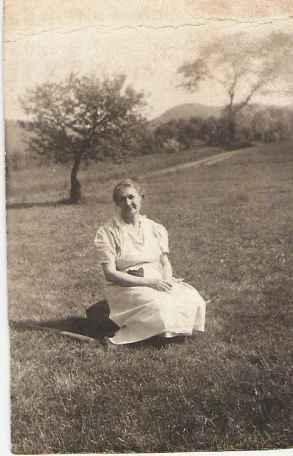 Philanthe
Kontolefa,
Philanthe
Kontolefa,Photograph is thought to be at the "Farm" in New Paltz, NY
Yayia had a difficult life. She was born to an extremely large and poor peasant (Tretakis) family. However, a somewhat more prosperous uncle who lived in a larger town was childless, and she was given to him and his wife to raise as their own. She would be occasionally visited by her brothers ("cousins") who would check up on her. When she was a young girl they visited to find her home alone. Her father had died some months before and her mother was off at the church getting remarried. Incensed that their uncle's widow was remarrying so soon after his death, her brothers forcibly took her back to their village up in the hills.She never saw the woman who raised her again. She had to adjust to the rigors of peasant life. Having gone to school in town she was one of the few literate persons in the village.
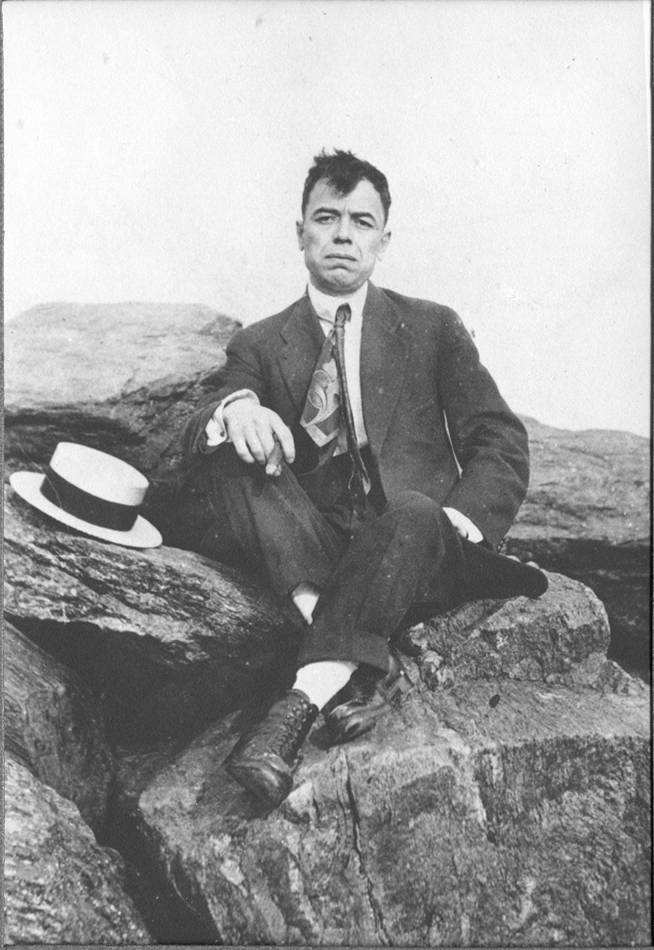
Peter’s Father, George Kontolefa.
Peter's father died when Peter was only 10 years old. Yayia Philanthe was forced to go on relief, and perform domestic work.
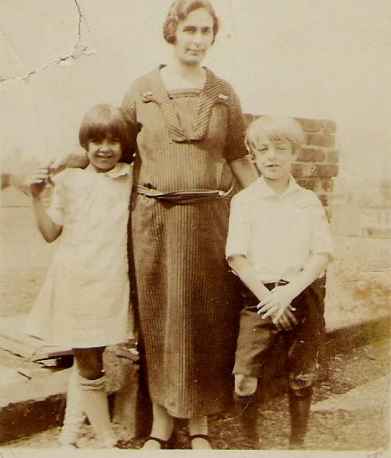 Peter with his mother and sister Carrie.
Peter with his mother and sister Carrie.
Peter was the "baby" of the family. He had four sisters.
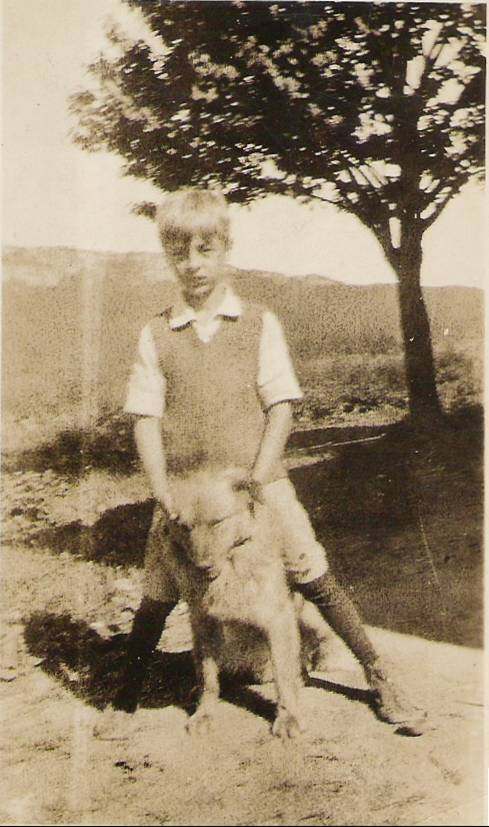 Best
Friends at the Farm..
Best
Friends at the Farm..
As a child Peter was diagnosed as anemic. In reality he had the trait for Thalassemia. Also, his mother had contracted Tuberculosis. It was recommended that he be removed from the city (a common recommendation for that period). Somehow or other, a farmer was found outside of New Paltz, NY that would take Peter during the summers.
Eventually, family members bought the farm, first as a working business, then as a retreat that family members would go to during summers. Often, several families of cousins would stay at the farm at the same time. The "Farm" as it was called, figured into family tragedy as well as many happy memories over the years. Members of the Takis family and several cousins currently reside on property that was once the "Farm" or very close by.
The picture with the dog raises an interesting question about one of Papau's earliest memories. The first time he went to the farm, his family traveled by train and trolley to New Paltz where the farmer met them with his wagon. (The trip took a whole day.) When they got to the farm at dusk, Peter jumped off the wagon and was attacked by a farm dog. The farmer beat the dog off, and it ran away. Although Peter wasn't injured, the farmer apologized profusely to his paying guests. The next morning as they came down to breakfast they heard a nearby gunshot. The farmer came in and told them not to worry about the dog any more....
High School Graduate!
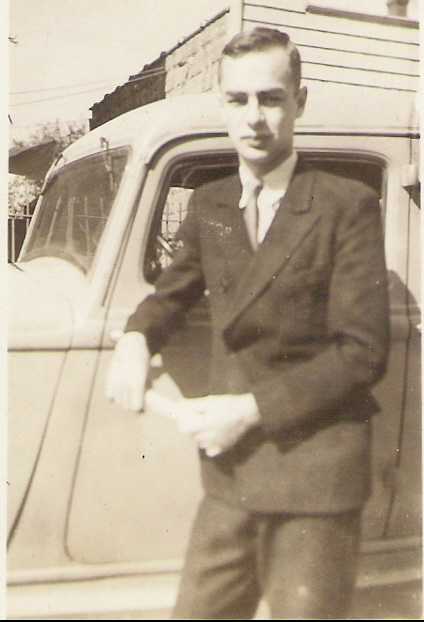
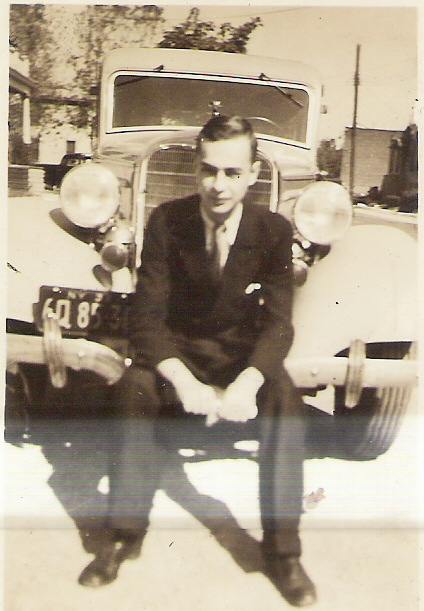
Unfortunately, the Great Depression was not a good time to hit the job market with a diploma from Newtown High School. Peter had an interest in electricity (electronics wasn't invented yet) and tried to find work in that area. He worked for a newspaper vendor, fruit seller, and various other jobs. He was eventually enrolled in the CCC and learned basic machining as a result.
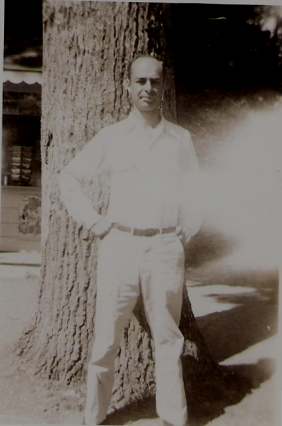 Once
manufacturing took off with the war in Europe, Peter got a job at a Ball Bearing
factory running a "Mutoscope" - some kind of optical comparator for
inspecting ball bearings. After the war was on for some months he noticed that
rather than scrapping defective ball bearings they were shipped off somewhere.
It turns out they were used in antipersonnel mines and bombs. The factory was
in Connecticut, and Peter boarded at an elderly ladies house. He rented half
a bed - he slept in it at night, and a night shift worker slept in it during
the day. When the United States got into the war, Peter was exempt from the
draft because of his defense related work.
Once
manufacturing took off with the war in Europe, Peter got a job at a Ball Bearing
factory running a "Mutoscope" - some kind of optical comparator for
inspecting ball bearings. After the war was on for some months he noticed that
rather than scrapping defective ball bearings they were shipped off somewhere.
It turns out they were used in antipersonnel mines and bombs. The factory was
in Connecticut, and Peter boarded at an elderly ladies house. He rented half
a bed - he slept in it at night, and a night shift worker slept in it during
the day. When the United States got into the war, Peter was exempt from the
draft because of his defense related work.
Like many men of that time, he wanted to join the war effort, but feared the loss of economic opportunity. He then finally got a call from the NYC Civil Service bureau - he could finally get into the Transit Authority. (He almost didn't get in due to his anemia and fast heart beat.) Not only was this job close to home, but after one year if he would enlist in the military, they would guarantee a job on his return. (Otherwise, as a railway worker he was exempt from the draft.) So it was...